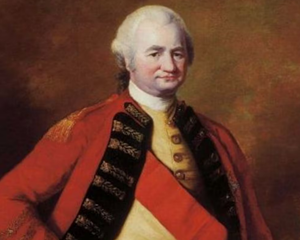Clive sailed north in Royal Navy ships, recaptured Calcutta and then pursued Siraj-ud-Daulah up-river.
克萊夫乘坐皇家海軍的戰艦一路北上,奪回了加爾各答,隨后溯流而上追擊西拉杰·烏德·達烏拉。
In June, 1757, he took on an Indian army that outnumbered his ten to one.
1757年6月,他遭遇了一支印度軍隊,其士兵人數是他麾下人數的十倍。
But Clive had been in India long enough to know that there was more than one way to fight a battle here.
但克萊夫久居印度,對此地頗為熟稔,他知道要想打贏戰爭并不是只靠蠻干。
The Battle of Plassey has gone down in imperial textbooks as one of those stellar victories, with a handful of European soldiers pulling off a long-shot victory against massed elephant cavalry.
普拉西之役是一場具有決定性的戰役,一直寫入大英帝國的歷史課本,歐洲士兵以少勝多,大敗印度的大象騎兵,贏得了這場冒險之戰。
What really happened was Clive cut a deal with Siraj-ud-Daulah's second-in-command, "Make sure your soldiers disappear and you can be the next Nawab."
而幕后的真相則是克萊夫與西拉杰·烏德·達烏拉的副將達成了協議,“只要你把你們的軍隊引開,我就任命你為新任納瓦布。”
Well, of course, he went for it. The soldiers duly evaporated and that was that.
那位副將自然依計而行。戰場上的印度軍隊作鳥獸散,不戰而降。
Courtesy of his tamed new Nawab, Clive helped himself to a quarter of a million pounds reward.
在這位恭順的新任納瓦布授意之下,克萊夫得到了25萬英鎊作為回饋。
It made the delinquent from Market Drayton one of the wealthiest men in Britain, and Baron Clive of Plassey.
這樣一來,當年什羅普郡的小混混搖身一變,成了英國最富有的人之一,還獲封普拉西克萊夫男爵。

When challenged, years later, at the scale of his plunder, Clive would reply:
多年后,人們指責他在普拉西進行了大舉掠奪,他卻辯解道:
An opulent city lay at my mercy. Vaults were thrown open to me alone, piled on either hand with gold and jewels. At this moment, I stand astonished at my own moderation.
一座豐饒的城市盡歸我有。我出入于只為我自己敞開的金庫,兩手抓滿了黃金和珠寶。此時此刻,我不禁對自己那時的節制大為驚奇。
The new Nawab would have disagreed. Clive cost him his independence, as well as his jewels.
而新任納瓦恐怕不敢茍同。因為克萊夫不僅剝奪了他的統治權,還奪走了他的財產。
The British could and would replace him at their whim.
英國人想將他罷免就隨時能罷免。
As Clive turned from a general into a power broker, an Indian Caesar, suspicions began to mount back in London.
當克萊夫由將軍轉變成政治掮客,進而變成印度的凱撒,倫敦的權貴們便開始議論紛紛。
Was this an economic exercise in damage containment or was it empire building?
他的舉措是為了減少損失的經濟手腕,還是圖謀建立起一個帝國?
For empires notoriously came with long bills.
要知道,帝國大多離不開債臺高筑的陰影。
But Clive was one step ahead of them. He would solve all their problems by turning Bengal into a money-making machine for the company.
但克萊夫棋高一著。他把孟加拉地區變成了東印度公司的搖錢樹,所有的質疑便不攻而破。
Not by trade, but by collecting its land taxes.
不是靠貿易,而是征收地稅。
The temptation was not just for company men to build private mega-fortunes, it was for the company itself to want to grow rich, fast.
這種做法所帶來的益處不僅僅是讓東印度公司員工肥了自己腰包,還能令公司財力愈發雄厚,發展更快。
This was just so much easier for the business. Increasingly, the stocking trade of British India was not spices, not cloth, but taxes.
如此這般,生意便更好做了。慢慢地,英屬印度最主要的貿易收入由來自香料和布料貿易轉向了稅收。
Taxes would pull down one empire in America, but now they were going to set one up in India.
苛捐雜稅令大英帝國失去了美洲殖民地,而現在他們想失之美洲,收之印度。



